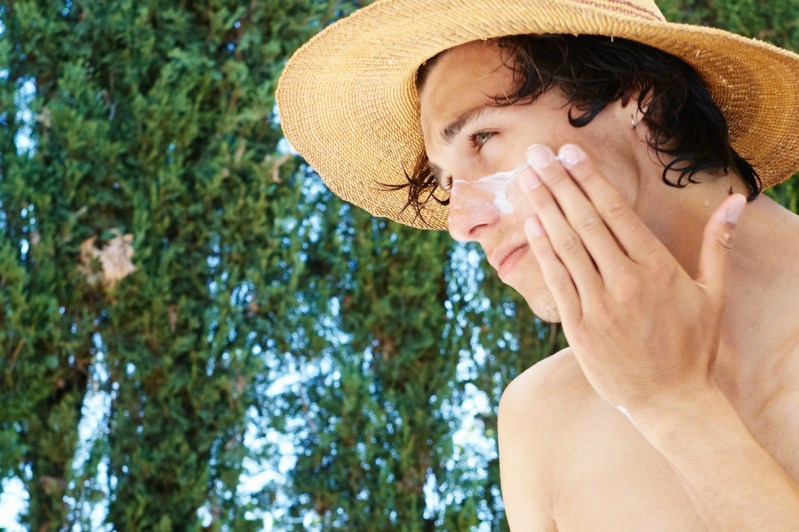
It’s high school graduation season, which means just one thing for the post-high school adult who has not yet begun to raise children: A reminder that you were supposed to be wearing sunscreen.
You know what I’m talking about—the tired but nonetheless ubiquitous commencement speech by Chicago Tribune columnist Mary Schmich that gets reprinted in every newspaper and referenced at every grad party. In this speech, the author puts “Wear sunscreen” as the top bullet point in her advice to the class of 1997.
Sorry, Mary, but odds are that nobody took that advice. Sunscreen, like drinking 64 ounces of water and flossing our teeth, is one of those things we almost never do while fully knowing we’re supposed to. But unlike those other healthy habits, skipping out on sunscreen all this time might have actually been doing the planet a favor.
It turns out that the majority of commercially produced sunscreens are full of chemicals that wreak havoc on ocean environments. The main culprits, oxybenzone, and octinoxate, are particularly harmful to coral reefs. The situation is so bad that on June 1, a Waikiki-based action group comprised of government officials, marine conservationists, scientists, activists, and professional surfers staged World Reef Day. This event featured a riff on a gun buyback program, only instead of firearms, participants dropped off bottles of mainstream sunscreen and received a bottle of mineral-based, reef-safe sunscreen made by Hawaii company Raw Elements.

It also turns out that skipping the sunscreen may have been doing your skin more good than harm. Last May, FDA researchers published a clinical trial that revealed sunscreen’s UV-blocking chemicals seep into your bloodstream. (For years, sunscreen makers have been insisting that they don’t.) According to the study, these chemicals show up in concentrations way above the safety threshold…and stay that high for three days after the sunscreen has been applied. At least one of these chemicals—oxybenzone again—is known to mess with the endocrine system and trigger allergic reactions.
There’s still a lot of testing to be done on sunscreen, to determine if these chemicals are truly toxic, and if so, in what concentrations. But for the time being, we opine that you’re better off ditching the mainstream sunscreen and opting for a mineral-rich, verifiably nontoxic sunscreen that protects your body and the earth.
Need a few suggestions? We thought you’d never ask.
The Best Natural Sunscreens
Bare Republic Mineral SPF 30 Sport Sunscreen Spray

Bare Republic’s spray sunscreen hits both of the main requirements for a great sunscreen (blocking UVA and UVB rays) and exceeds them by adding a dose of amazing scent. Zinc oxide and titanium oxide act as the main ingredients in this sunscreen, meaning it does require rubbing in after spraying on, but we think that makes it even better because it forces you to really know where you’ve applied it. What’s better, it goes on slightly white, which also helps to prevent missing a spot. Finally, it’s water resistant and only needs reapplication every 80 minutes. With all these great features, is it any wonder that this is a winner for The Manual Grooming Awards 2019?
Supergoop!

This lightweight but ultra-effective SPF 50 sunscreen deserves that exclamation point included in its brand name. It offers the trifecta of sunscreen virtues: Spreads smoothly, absorbs in seconds, and doesn’t clog pores. It even offers a subtle but delightful scent. Free of shady parabens (which cause an overabundance of estrogen) and phthalates (linked to – yikes – testicular problems), it’s our top choice for daily wear, as well as for those with sensitive skin.
Raw Elements Face + Body SPF 30

Who better to mastermind a sunscreen than a professional lifeguard? This ultra-crunchy SPF sunscreen boasts a shortlist of certified natural ingredients: Zinc oxide to block UV rays; beeswax and cocoa butter to help it spread; black tea for antioxidant power; and hempseed oil for cell repair. We also like that this 1% for the Planet member company helped pioneer the movement to protect coral reefs.
Neutrogena SheerZinc Face Sunscreen SPF 50

Sometimes you can’t wait for the UPS guy to show up with your special sunscreen order. When the pool party starts in twenty minutes, drop into the local CVS and pick up Neutrogena’s zinc oxide-based sunscreen. While it does leave your face looking a little ghosty at first, it spreads smoothly and protects your skin and your health.
Thinksport Natural Sunscreen SPF 50

If you’re going to be sweating hard under the sun, this hard-wearing sports sunscreen should be your go-to. While it’s a little clumpy at first, it guarantees protection for up to 80 minutes, even under water. Free of parabens, phthalates, and any off-putting scents, this sunscreen has been featured by everyone from Men’s Health to Metro Moms and boasts more awards than the lead trainer at your CrossFit gym.
For even more environmentally friendly sunscreens, check out our favorite reef-safe SPFs.


